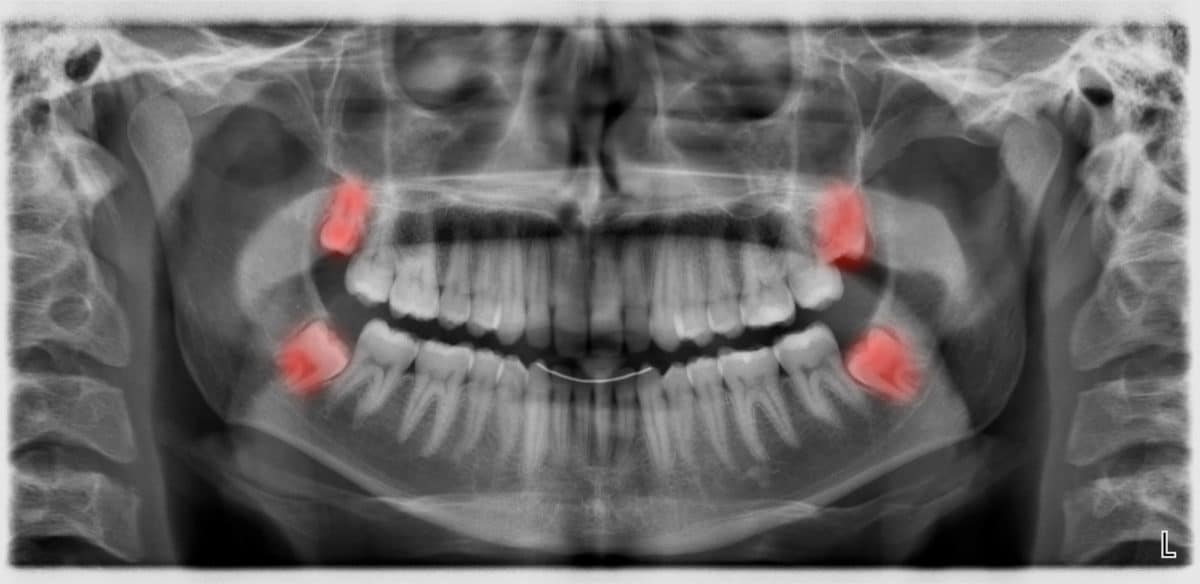Wisdom Teeth, Jacksonville, FL
What are wisdom teeth?
Third molars are commonly referred to as “Wisdom Teeth”. They are usually the last teeth to develop and are located in the back of your mouth, behind your second molars. Their development is usually completed between the middle teenage years and early twenties, a time traditionally associated with the onset of maturity and the attainment of wisdom.
Wisdom Teeth
What is an impacted tooth?
Although most people develop and grow 32 permanent adult teeth, many times their jaws are too small to accommodate the four wisdom teeth. When inadequate space prevents the teeth from erupting they are called impacted wisdom teeth. This indicates their inability to erupt into the proper position for chewing and cleaning.
We will need to see you for a consultation to determine if you will benefit from wisdom tooth removal. A special x-ray of your mouth and jaws (panorex) will be taken to determine if your wisdom teeth are impacted, or if there is room for them to erupt, and how difficult it will be to have them removed.
Wisdom Teeth Removal
Consultation and Oral Examination
With an oral examination and x-rays of the mouth, Dr Joseph will evaluate the position of the wisdom teeth and predict if there are present or future potential problems. Studies have shown that early evaluation and treatment result in a superior outcome for the patient. Patients are generally first evaluated in the mid-teenage years by their dentist, orthodontist, or by an oral and maxillofacial surgeon.
Why should I have my wisdom teeth removed?
If you do not have enough room in your mouth for your third molars to fully erupt, a number of problems can happen. Impacted Wisdom teeth should be removed before their root structure is fully developed. In some patients it is as early as 12 or 13, and in others it may not be until the early twenties. Problems tend to occur with increasing frequency after the age of 30. Some of the possible problems related to not removing your wisdom teeth include:
• Infection
• Cyst Formation
• Crowding
• Damage to Adjacent Teeth
What happens on the day wisdom teeth are removed?
All outpatient surgery is performed under appropriate anesthesia to maximize your comfort. You will be given Anesthesia Options at your consultation. Most people prefer to be sedated when they have their wisdom teeth removed. We utilize modern monitoring equipment and our staff has the training, and experience to provide various types of anesthesia in an environment of optimum safety. Our team, the office facilities, and the doctors are inspected and licensed by the State of Florida on a regular basis.
A parent or responsible adult should accompany you to the office and plan to stay with you the rest of the day. The procedure will take about 30 to 60 minutes and you will probably be in the office for 90 minutes. State-of-the-art sterilization and infection control techniques are used at all times.
On the morning of your surgery, it is essential that you have nothing to eat or drink (excluding prescription medications with a sip of water) for at least 6 hours (preferably longer). Having anything in your stomach can increase the risk for serious anesthetic complications, including nausea and vomiting. We may provide you with a prescription for pain medication at your consultation appointment, which can be filled in advance.
If you are going to be sedated, we will place an IV in your arm. This is a quick and nearly painless procedure that ensures optimal delivery of your medication. Local anesthesia is then given to ensure comfort. You will be sleepy for a significant portion of the day.
If your surgery requires stitches, these are usually the type that dissolve in 3 to 5 days and do not require removal. You may also experience swelling. This is all part of the normal recovery, and will subside in several days.
You will be seen for a follow-up visit usually 7-10 days later.
Frequently Asked Questions About Wisdom Teeth
What is a Wisdom Tooth? Third molars are commonly referred to as wisdom teeth. They are usually the last teeth to develop and are located in the back of your mouth, behind your second molars. Their development is usually completed between the middle teenage years and early twenties, a time traditionally associated with the onset of maturity and the attainment of wisdom.
What is an Impacted tooth? An impacted tooth is one that there is not enough room for the tooth to come into the proper position in the mouth.
Should all wisdom teeth be removed? Not always. In some patients, there is enough room to have the third molars in proper position with good chewing function and adequate ability to be easily cleaned. However, in the majority of cases, there is not enough room for the wisdom tooth to come into the proper position which may result in impaction and other conditions which could result in infection and destruction of the jawbone or adjacent teeth.
Why should I have my wisdom Teeth Removed? If you do not have enough room in your mouth for your third molars to fully erupt, a number of problems can happen. Impacted Wisdom teeth should be removed before their root structure is fully developed. In some patients it is as early as 12 or 13, and in others it may not be until the early twenties. Problems tend to occur with increasing frequency after the age of 30. Some of the possible problems related to not removing your wisdom teeth include:
• Infection
• Cyst Formation
• Crowding
• Damage to Adjacent Teeth
Will my insurance cover the costs? Dental insurance often covers a portion of the cost of removal of impacted Wisdom Teeth.


